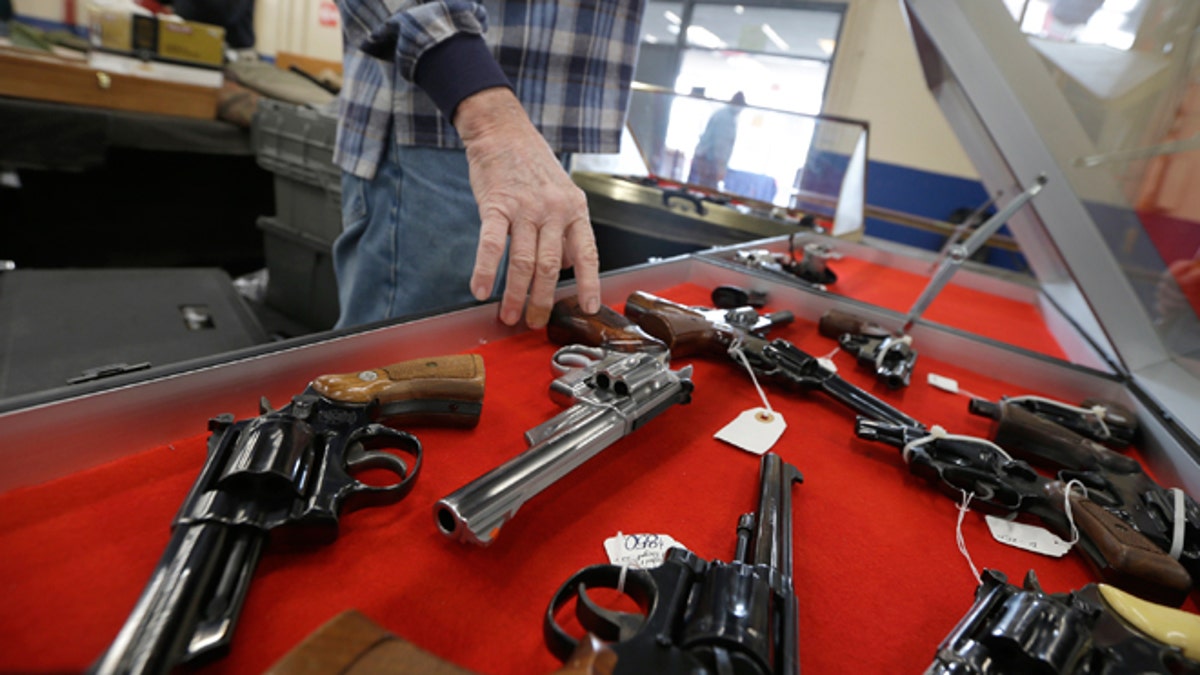
FILE -- Feb. 6, 2015: A dealer arranges handguns in a display case in advance of a show at the Arkansas State Fairgrounds in Little Rock, Ark. (AP Photo/Danny Johnston)
Which is more likely to kill you: a car or a gun? Various publications, from The Economist to Forbes, and many others have been reporting that gun deaths are set to overtake road deaths before the year is up. But not only isn’t that going to happen. Car deaths have indeed fallen more than gun deaths, but that’s not because of comparatively stringent safety regulations.
Gun control advocates brag that they have “a statistic that really resonates with people.”
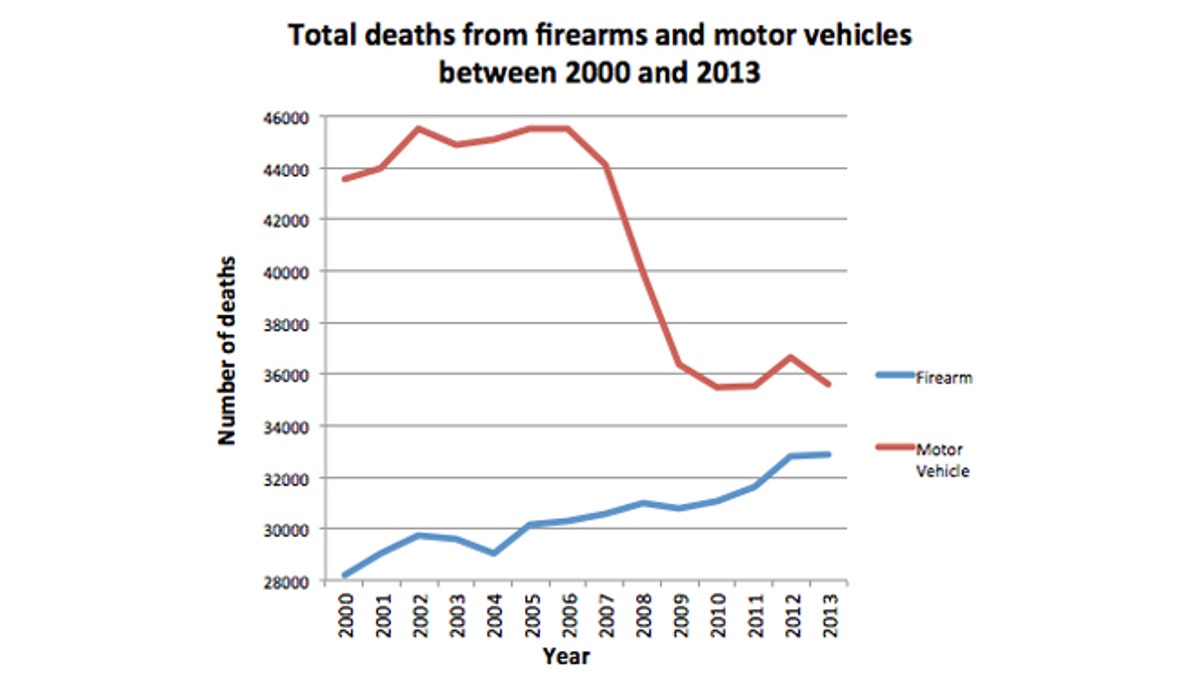
(Courtesy of the author)
The latest data we have are from 2013. In that year, 35,598 people died from motor vehicle deaths. 32,888 died from gun deaths. The gap has narrowed since 2000, when motor vehicle deaths were 43,563 and gun deaths were 28,163.
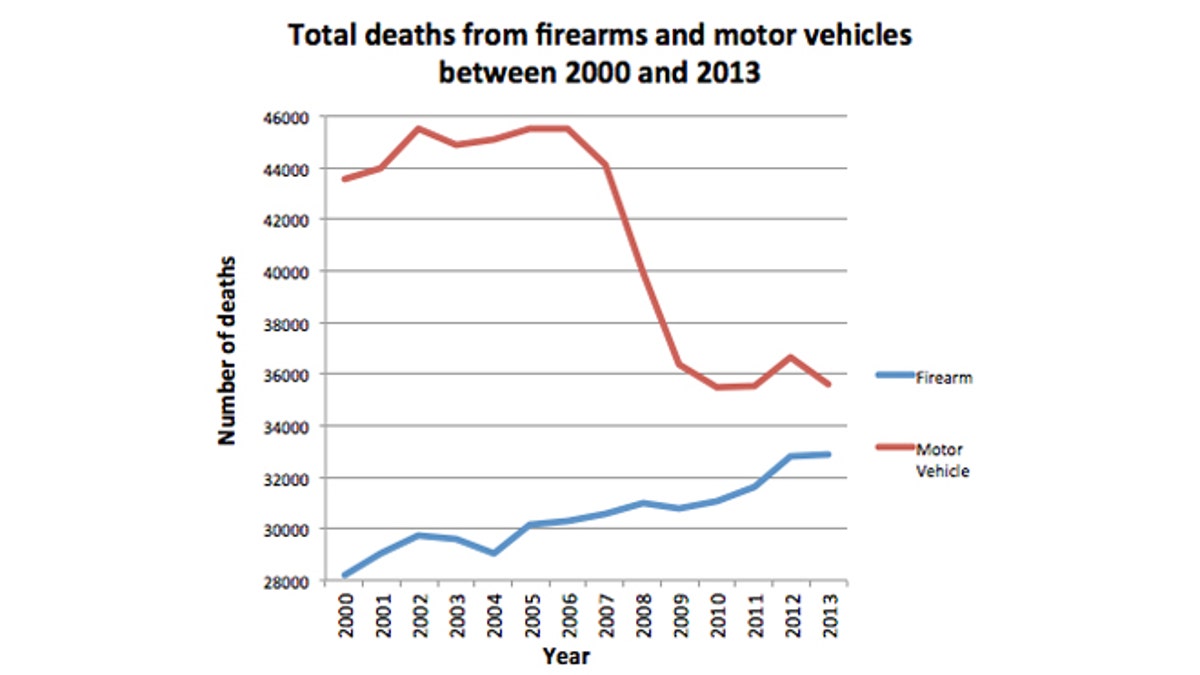
(Courtesy of the author)
Since the year 2000, motor vehicle deaths only really changed between 2008 and 2010, when the recession was at its worst. During that time, deaths fell by more than 20 percent.
Why the sudden drop? It wasn’t because of any safety regulations suddenly going into effect in late 2007. There’s a much more prosaic explanation: during the recession and anemic recovery, people drove less. Higher gasoline prices continued to make people cut back on driving.
After being stuck at over $3 a gallon for the last three years, gas prices only fell below that level last November. Gas prices are now down to about $2 a gallon. The economy has eventually recovered somewhat. As a result, motor vehicle deaths are very unlikely to continue falling.
There is a more basic problem with these claims. The causes of death are very different.
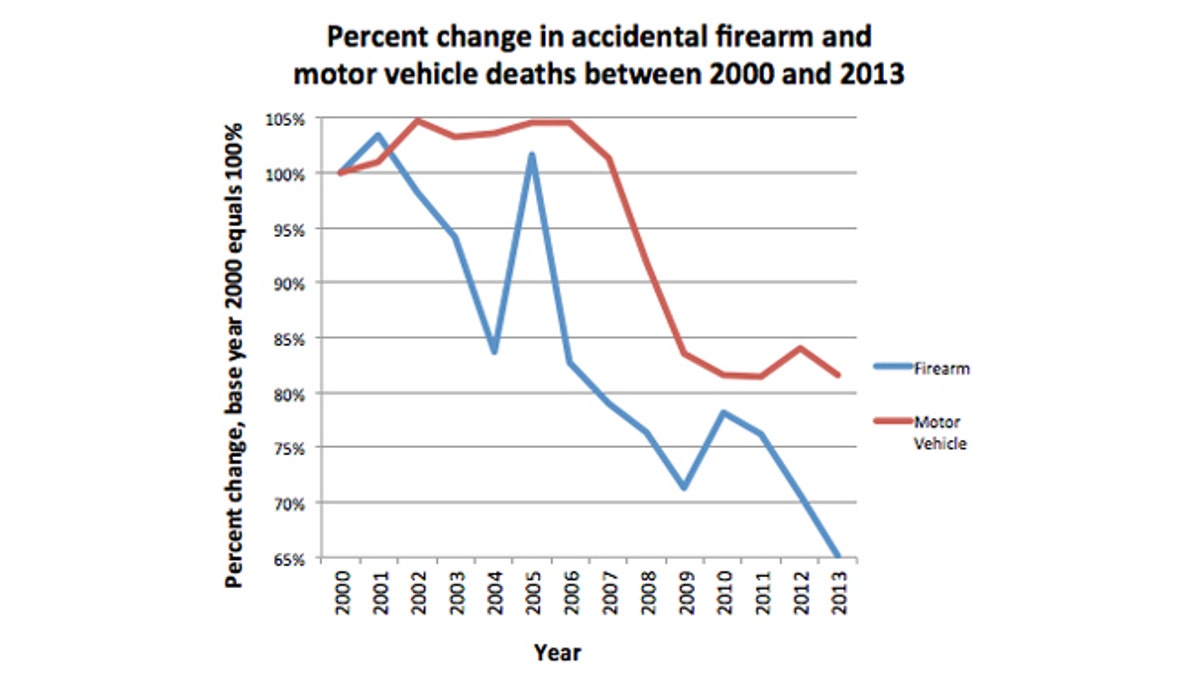
(Courtesy of the author)
In 2013, 99.4% of car deaths were accidental in nature. Only 1.5% of gun deaths were accidental. A staggering 64% of gun fatalities are suicides. But if increased safety regulations are the solution, why is it that between 2000 and 2013 accidental deaths from guns fell twice as much as those from cars (35% to 18%)?
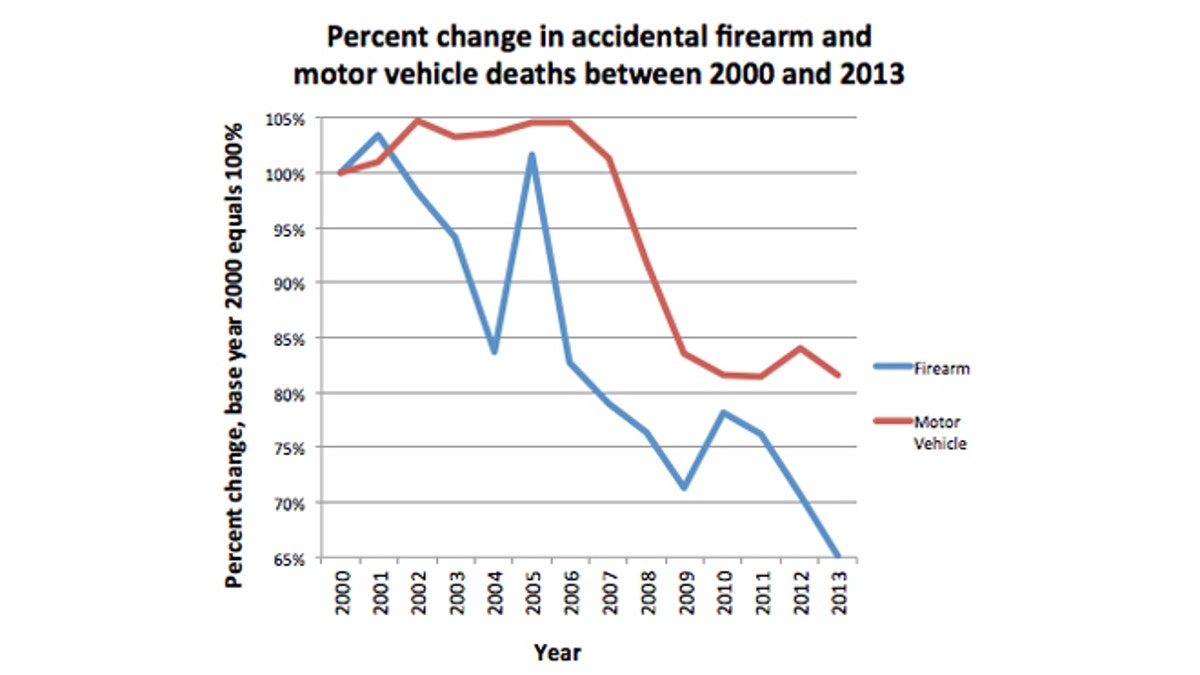
(Courtesy of the author)
So much for the Forbes’ explanation: “While automobiles have long been subject to licensing and registration, as well as engineering mandates designed to protect occupants in a collision, comparatively few restrictions exist on gun ownership.”
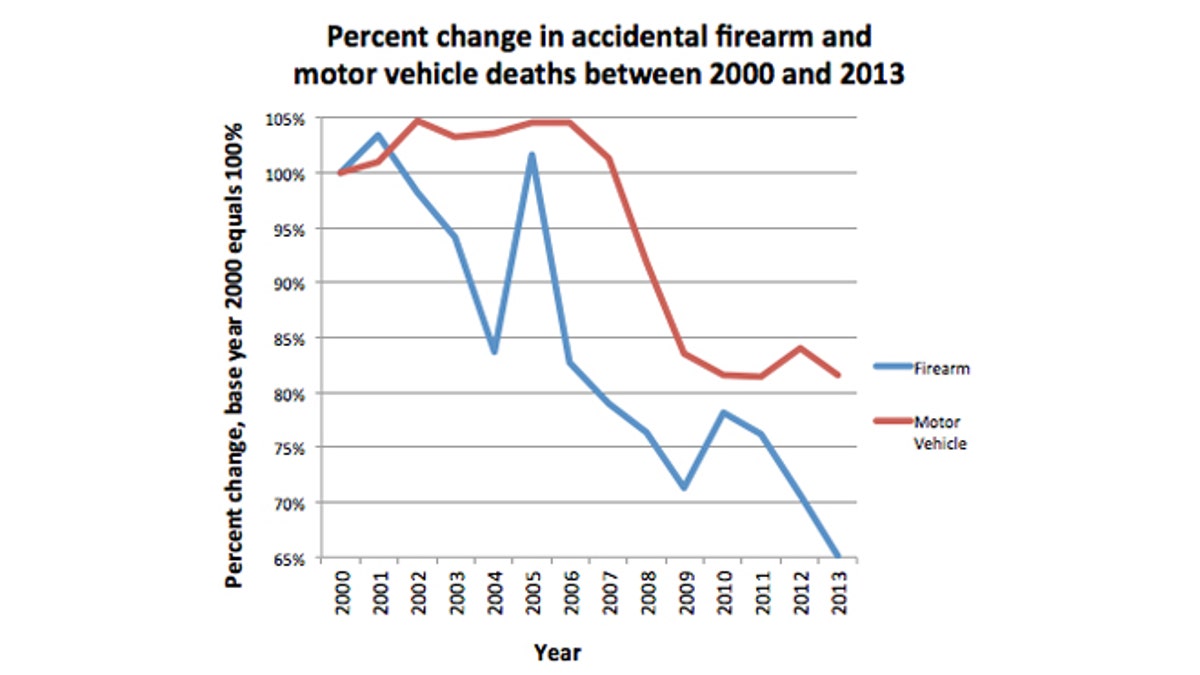
(Courtesy of the author)
Despite fewer murders and accidental gun deaths, gun deaths have risen slightly because of a 28% increase in firearm suicides. But non-firearm suicides increased even faster (56%) – something is causing suicides in general to rise.
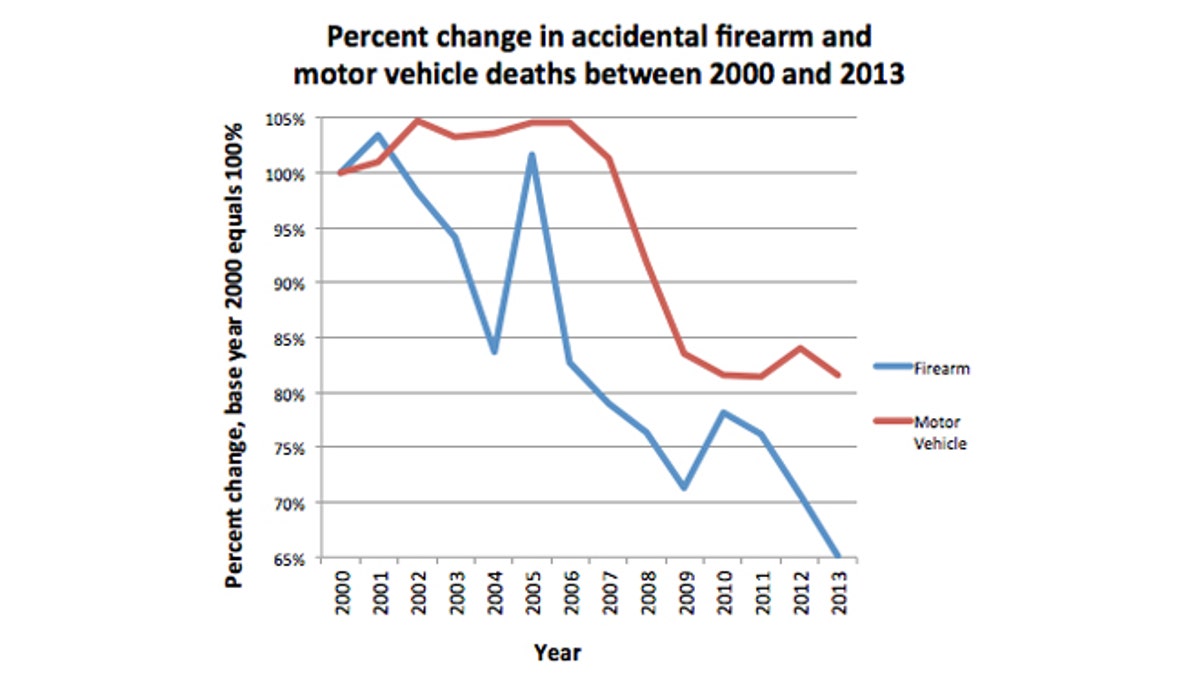
(Courtesy of the author)
Even if the sudden drop in motor vehicle deaths during 2008 to 2010 was due to regulations, that doesn’t imply that gun control regulations would have the same result.
Forbes called for “technology that would only allow a firearm to be unlocked by an owner’s fingerprint or a radio frequency encryption.” But fingerprint readers are hardly perfect – think iPhones if you want to know where state of the art stands these days. WiFi signals can prevent guns from being fired in certain places, but it’s possible for criminals to copy the radio frequencies and stop victims from defending themselves.
The current “smart gun” requires that the shooter wear a watch which emits radio signals. With the price of these guns running at $1,399 plus $399 for the watch, requiring such “smart” technology would dramatically reduce gun ownership. The people who will be priced out of owning guns are the very people who need protection the most -- poor, law-abiding people who live in high-crime, urban areas.
Michael Bloomberg’s gun control groups advocate “expanded” background checks as the ultimate safety regulation, but it’s unclear how it would pertain to accidental deaths or suicides.
Of course, the regulations would still be worth it if they could prevent violent crime. But the current system is a mess. In the vast majority of cases, law-abiding citizens are denied gun purchases because they happen to have names similar to those of people the system is actually intended to stop. This is only one reason why academic studies consistently find that background checks have failed to reduce violent crime. Stopping drug gangs from getting guns is about as easy as stopping them from getting drugs.
The Economist points to a new Bloomberg-backed study claiming that prohibited people with criminal records made 7 out of 169 online gun purchases. Unfortunately, they merely verify that people with names similar to those who are actually prohibited were interested in buying guns. They never showed that prohibited people actually bought a gun.
Some guns were listed as having not gone through background checks, when in fact they had. In reality, Bloomberg’s groups have inadvertently exposed the problems with the current background check system.
So will gun control advocates ever explain why accidental gun deaths have fallen more than those for cars? Or why non-firearm suicides rose twice as fast as firearm suicides? I predict they never will.








































